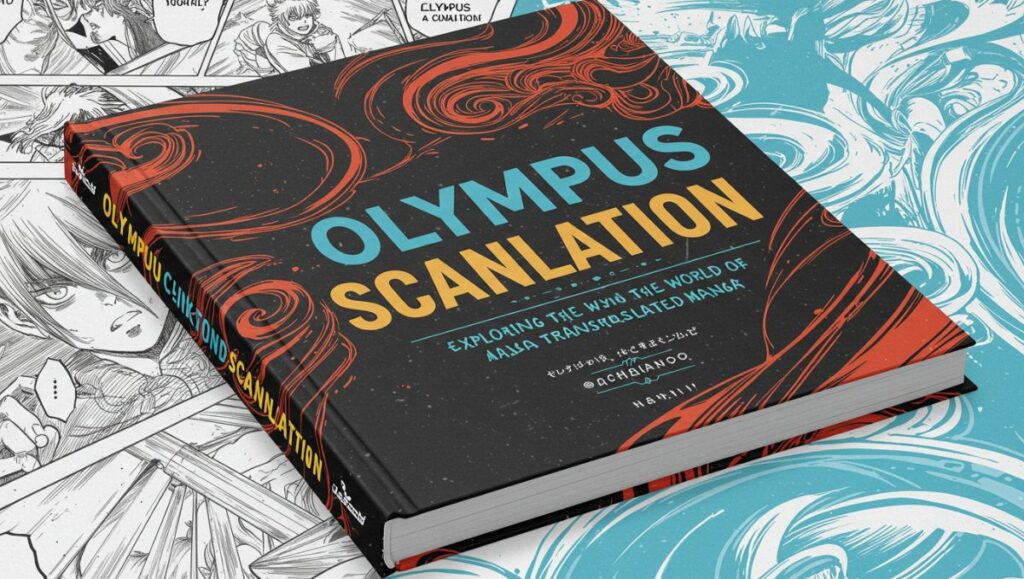For millions of manga fans around the world, reading their favorite Japanese comics in English or other languages has long depended on one key phenomenon — scanlation. This term combines “scan” and “translation,” referring to the fan-driven process of scanning, translating, and editing manga for non-Japanese readers.
Among the many groups that emerged to bring manga to global audiences, Olympus Scanlation became known for its dedication to high-quality translations, faithful editing, and fast releases. While largely underground and fan-driven, groups like Olympus Scanlation have played a major role in spreading manga culture far beyond Japan.
This article dives into the story of Olympus Scanlation, what scanlation is, how these groups operate, and their influence — both positive and controversial — on the global manga community.
What Is Scanlation?
Scanlation is the fan-based process of scanning manga pages, cleaning them, translating the text into another language, and re-lettering the dialogue — all before releasing it online for free.
The typical scanlation workflow involves:
-
Scanning physical manga pages or digital raws.
-
Cleaning the images — removing Japanese text, fixing tones, and enhancing clarity.
-
Translating the dialogue and sound effects into another language.
-
Typesetting the translated text back into the manga panels.
-
Proofreading and quality control before release.
The final product is shared online through fan communities, allowing readers around the world to enjoy manga that hasn’t yet been officially licensed or translated.
Who Is Olympus Scanlation?
Olympus Scanlation is (or was) a fan translation group known for its dedicated work on manga and webtoons, primarily those that were unavailable in English or slow to receive official translations.
Like many scanlation groups, Olympus operated as a volunteer collective made up of passionate fans — translators, editors, proofreaders, cleaners, and typesetters — who collaborated online. Their goal was to share great stories, not profit from them.
Focus and Genres
Olympus Scanlation specialized in translating titles that had strong fan interest but limited international exposure. These often included:
-
Romance and drama manga.
-
Action and fantasy series.
-
Independent or lesser-known titles not picked up by major publishers.
-
Occasionally, webtoons or Korean manhwa.
Their projects often attracted loyal followings thanks to their accuracy, speed, and attention to detail.
The Mission Behind Olympus Scanlation
Olympus Scanlation, like many fan translation groups, was driven by a clear philosophy:
“If the publishers don’t bring it to the fans, we will.”
At its heart, the group’s mission was to make manga accessible to everyone, especially readers who didn’t have access to Japanese publications or official English translations.
Key Objectives
-
Cultural Accessibility: To introduce non-Japanese readers to unique stories and authors.
-
Language Practice: To help fans learn Japanese through side-by-side translation exposure.
-
Community Engagement: To create a shared space for manga lovers to discuss and appreciate art, storytelling, and translation.
-
Preservation: To digitally archive manga that might otherwise remain out of print or unavailable.
How Olympus Scanlation Operated
Most scanlation groups — including Olympus — followed a structured yet community-based workflow.
1. Team Collaboration
Olympus operated through online platforms like Discord, IRC, or dedicated forums, where team members collaborated across time zones. Roles were divided as follows:
-
Raw Providers: Sourced the original Japanese manga scans.
-
Cleaners: Removed text bubbles and restored artwork.
-
Translators: Converted Japanese dialogue into English.
-
Proofreaders: Polished grammar and improved flow.
-
Typesetters: Added the new English text back into the manga panels.
2. Release Process
After editing and review, completed chapters were uploaded to popular manga reading sites, such as:
-
MangaDex
-
MangaReader
-
Batoto (before its closure)
These uploads were typically labeled with credits pages, acknowledging the Olympus Scanlation team and thanking readers for support.
Impact of Olympus Scanlation on Manga Culture
1. Expanding Global Reach
Olympus and other scanlation groups played a major role in expanding manga’s global fan base. Before publishers like Viz, Kodansha, and Shueisha ramped up their digital offerings, fans relied heavily on scanlations to access new content.
2. Cultivating Fan Communities
Olympus fostered tight-knit online communities, where readers could discuss chapters, theories, and characters in real time. These communities became spaces of cultural exchange and friendship.
3. Supporting Niche Titles
Many smaller or indie manga would have gone unnoticed outside Japan if not for fan translation groups. Olympus often focused on underrated or overlooked stories, giving them a global audience.
4. Influencing the Official Market
Ironically, the popularity of certain scanlated titles helped publishers recognize international demand. Many series that started as fan translations were later licensed officially due to their scanlation-driven popularity.
The Controversy: Ethics and Legality of Scanlation
While Olympus Scanlation and similar groups operate from passion, scanlation exists in a gray legal area.
Copyright Concerns
Manga is protected by international copyright law. When groups scan, translate, and distribute manga without permission, they technically violate the intellectual property rights of creators and publishers.
Industry Response
Japanese publishers and international distributors have long opposed scanlations. Over the years, they have:
-
Issued takedown notices to sites hosting unauthorized content.
-
Collaborated on global anti-piracy campaigns.
-
Created official digital platforms like MANGA Plus, Crunchyroll Manga, and BookWalker to offer legal access.
Olympus Scanlation’s Position
Groups like Olympus often tried to strike a balance between fan enthusiasm and ethical awareness. They typically:
-
Stopped working on a series once it was officially licensed.
-
Included disclaimers urging fans to support the original creators.
-
Avoided monetizing their work (no paywalls or ads).
Despite these precautions, scanlation remains controversial — celebrated by fans, but criticized by the industry.
Technological Evolution and the Decline of Traditional Scanlation
As the manga industry embraced digital transformation, the role of scanlation groups began to change.
1. Rise of Legal Platforms
Services like Shonen Jump, MANGA Plus, and Webtoon now offer same-day releases in multiple languages, reducing the need for unofficial translations.
2. AI and Machine Translation
New tools powered by AI translation have made the process faster, though human scanlators like Olympus still emphasize quality and cultural nuance.
3. Community Shifts
Many scanlation groups have transitioned into localization communities, focusing on fan reviews, analysis, and cultural commentary rather than raw translations.
Olympus Scanlation’s Legacy
Though Olympus Scanlation may no longer be active (as many such groups disband or evolve over time), its impact remains clear:
-
It preserved and popularized numerous manga that might have otherwise been forgotten.
-
It inspired translators, editors, and artists who later entered professional manga publishing.
-
It demonstrated the power of grassroots fan collaboration in shaping global entertainment trends.
Olympus, like many fan translation groups, represents the passion that fuels global fandom — a bridge between cultures and languages that continues to influence how people discover manga today.
The Cultural Value of Fan Translation
While often dismissed as “piracy,” scanlation also has undeniable cultural value. It:
-
Encourages cross-cultural literacy.
-
Promotes interest in the Japanese language and culture.
-
Keeps out-of-print works accessible to future generations.
-
Inspires community-driven creativity, from fan art to essays and discussions.
Olympus Scanlation was part of that global movement — one that made manga not just a Japanese art form, but a shared global culture.
Conclusion
Olympus Scanlation exemplifies the passion, dedication, and community spirit that define the manga fan world. While operating in a legal gray zone, its contributions to accessibility, fandom, and cultural exchange cannot be ignored.
As official publishers continue to expand legal access, the legacy of groups like Olympus remains as a reminder of how fans helped build the foundation of global manga culture — driven not by profit, but by love for the art.






